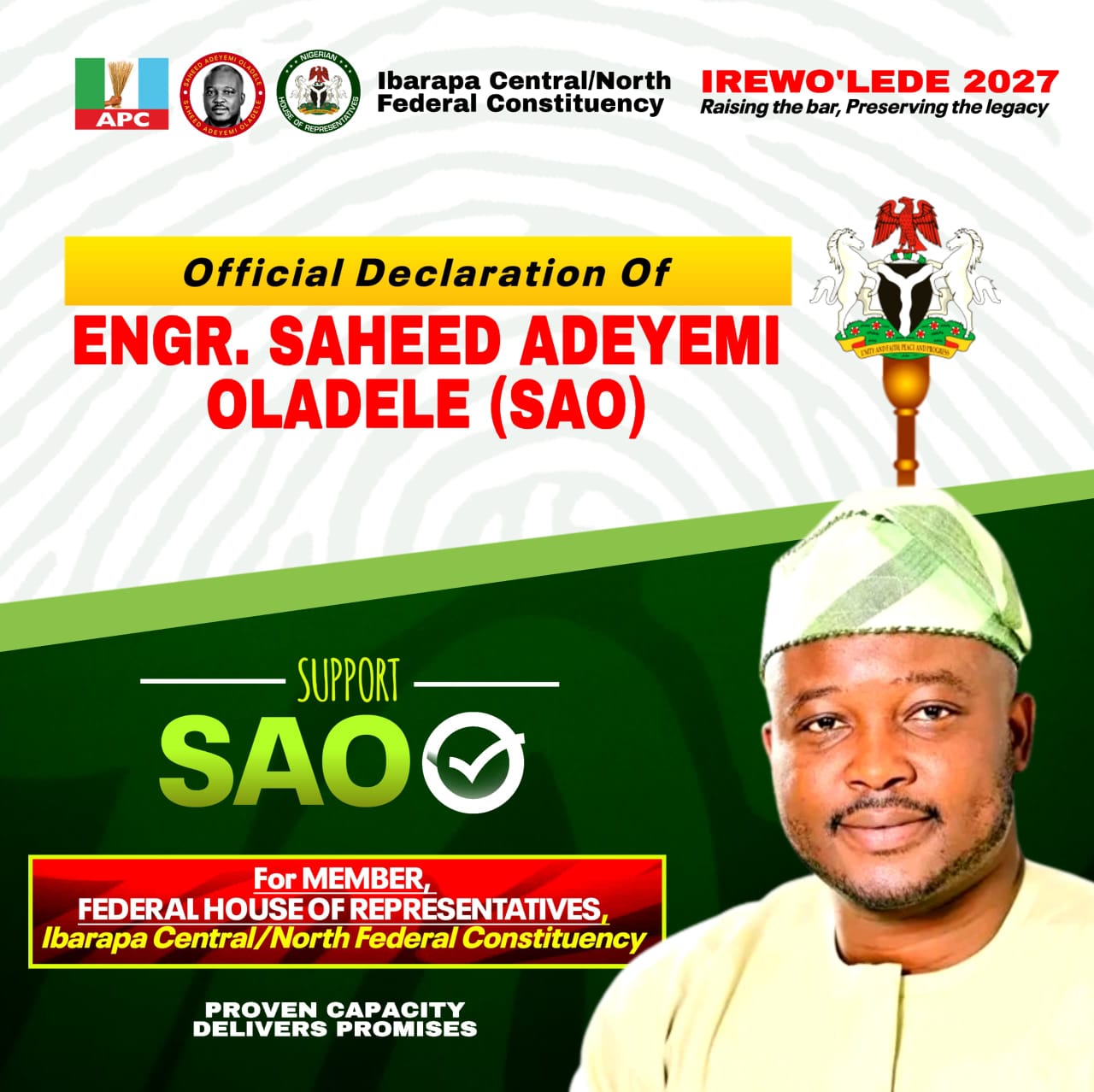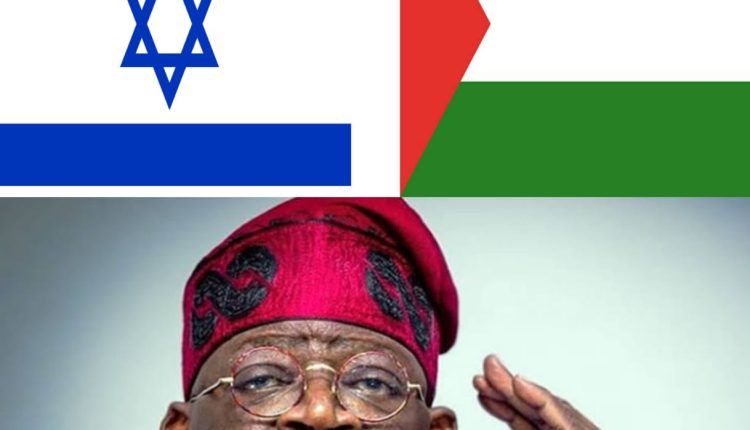The Israeli-Palestinian Conflict : Will There Be ill-effect In Nigeria? By Industreet Bashorun Saintabey


The Israeli-Palestinian conflict is a complex and longstanding issue that has garnered international attention and concern. Nigeria, as a member of the United Nations and an active participant in global affairs, has been involved in addressing the conflict in various ways. Nigeria has always expressed support for a peaceful resolution of the conflict in an war prone zone and it will be good for both parties to engage in dialogue and negotiate a lasting solution.
Nigeria has also been engaged in diplomatic efforts to promote peace and stability in the region. Nigeria has participated in international forums and organizations, such as the United Nations Security Council, where it has advocated for a just and peaceful resolution which is similar to what the government of Nigeria will also do in the Israeli-Palestinian conflict.

Bilateral relations between Nigeria, Israel, and Palestine have evolved over time and are influenced by various factors. Nigeria and Israel have maintained diplomatic relations since Nigeria gained independence in 1960. The two countries have cooperated in various fields, including agriculture, education, defense, and technology. There is also a significant Nigerian Christian population that has historical and religious ties to Israel. However, the relationship has also faced challenges at times due to political differences and the Israeli-Palestinian conflict.
Nigeria has been a vocal supporter of the Palestinian cause and has recognized Palestine as an independent state since 1988. Nigeria has consistently advocated for a two-state solution and the rights of the Palestinian people. Nigeria has also provided humanitarian aid and support to Palestinians in various forms, including diplomatic support in international forums.
Nigeria has maintained economic relations with both Israel and Palestine. Nigeria imports goods from Israel, particularly in the areas of agriculture, technology, and defense. On the other hand, Nigeria has also provided financial support and humanitarian aid to Palestine. Nigeria has occasionally played a role in mediating between Israel and Palestine. For instance, in 2014, Nigeria’s former President Goodluck Jonathan hosted talks between Israeli and Palestinian leaders in an effort to find a peaceful resolution to the conflict.
It is important to note that the Israeli-Palestinian conflict is a highly sensitive and complex issue with deep historical and political roots. While Nigeria, like many other countries, has expressed its views and taken certain actions to address the conflict, ultimately, a peaceful resolution can only be achieved through direct negotiations between the parties involved. The Israeli-Palestinian conflict is a regional issue that primarily affects the parties involved, namely Israel and Palestine, as well as the surrounding Middle Eastern countries. While Nigeria has expressed its support for a peaceful resolution to the conflict, it is unlikely to experience direct ill-effects as a result of the conflict.

However, there is need to recognize that the Israeli-Palestinian conflict has the potential to impact global dynamics, including political, social, and economic aspects. As a member of the international community, Nigeria, like other countries, may be influenced indirectly by any escalation or prolonged nature of the conflict. This can include diplomatic repercussions, shifts in regional alliances, or even economic implications due to changes in global energy markets.
Nevertheless, Nigeria has its own unique set of challenges and conflicts to address, and the impact of the Israeli-Palestinian conflict on Nigeria would likely be in a broader, global context rather than having direct consequences within the country. The focus should remain on finding a peaceful resolution to the Israeli-Palestinian conflict and promoting stability in the region, while Nigeria continues to address its own internal issues and work towards its own development goals.
Security challenges in Nigeria are complex and multifaceted, requiring a comprehensive and holistic approach. President Tinubu’s specific strategies and policies to address insecurity would need to be based on a thorough assessment of the situation and take into account the diverse factors contributing to the challenges.
The Israeli-Palestinian conflict has been exploited by extremist groups in the past to promote their own agendas and recruit supporters. While Nigeria has its own security challenges, it is important to monitor and address any potential radicalization or extremist narratives that may arise from the conflict. The Israeli-Palestinian conflict can have indirect economic effects, such as fluctuations in oil prices and global markets. Nigeria, being a major oil producer and exporter, could be impacted by any disruptions or instability in the global economy resulting from the conflict.
Nigeria has a diverse population with various religious and ethnic groups. The Israeli-Palestinian conflict, which has religious and political dimensions, can sometimes influence domestic dynamics and public opinion. It is possible that events related to the conflict could evoke strong emotions and polarize certain segments of Nigerian society.
Nigeria’s stance on the Israeli-Palestinian conflict may influence its relations with other countries, especially those that have different positions. Diplomatic tensions or shifts in alliances could have indirect consequences for Nigeria’s international relations and trade partnerships. The dynamics of these relationships can evolve and be influenced by changing political circumstances and international developments. The specific approach taken by President Tinubu towards Nigeria’s relations with Israel and Palestine would depend on his foreign policy priorities and the prevailing regional and international dynamics at the time.
Nigeria Government need to maintain a balanced approach in its relations with Israel and Palestine, while also addressing the domestic concerns and ensuring the well-being of its citizens. Nigeria’s foreign policy decisions should be guided by its national interests, regional dynamics, and a commitment to peace, stability, and respect for international law.
Bashorun Saintabey is a socio – philosopher, author, reformer, coach and public policy expert, a seasoned academia who loves to write about social related and contemporary issues.
...For the latest news update, Subscribe to our Whatsapp Channel (Click Here) and join our Telegram Update Group (Click Here)

You can also advertise your Product and Services on our page for more patronage
Contact us today by sending your Stories, Articles, Events, and Eyewitness Reports for publications as well as products and services for advertisement to westerndailies2018@gmail.com or WhatsApp (+2348058448531) for more information



